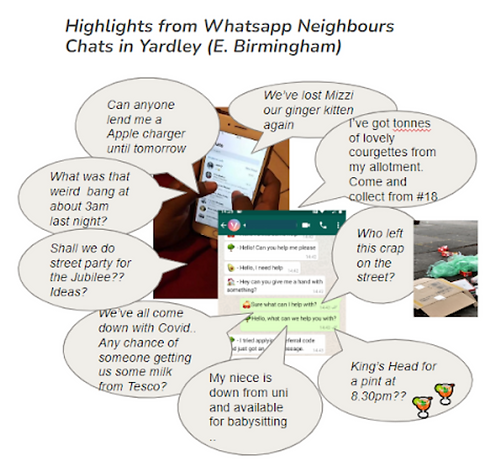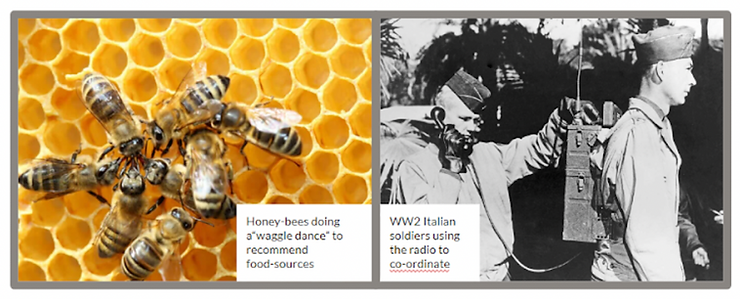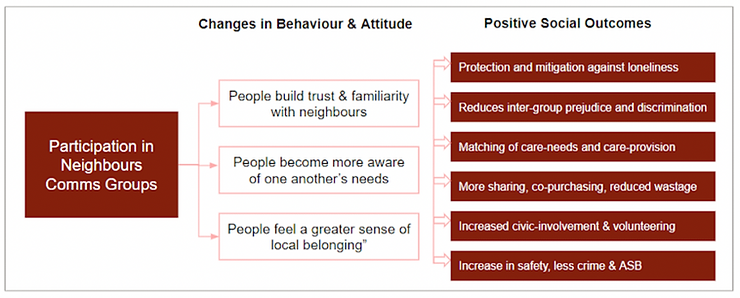Neighbours Comms Groups: Superpowers and FOMO
We at Neighbourly Lab believe that local neighbourhood comms groups are an essential tool for increasing social-connectedness in the UK. Neighbours that are joined up together in these groups are more likely to get to know each other, build trust in one another, participate in local events and democracy and share resources. And this basic layer of hyperlocal comms enables neighbours to create an everyday “mesh of care”, to look out for one another in times of need, and to assert their collective power to shape their place’s future prosperity.
But, there’s a but – and it’s a big one. These groups are more common in wealthier areas, and more sparse in poorer or more ethnically diverse areas. There are real costs for people who are not joined up with their neighbours, especially for people who are poorer or more vulnerable. Therefore we are working to widen participation in these groups more inclusively to everybody. This blog sets out the case for why these groups matter so much and why we’re fearful for people who are missing out on them.
What kind of groups are we talking about here?
Informal groups for neighbours, usually taking in a street or a block or a village (ie “hyperlocal”). Mostly these groups are organised on Whatsapp; and sometimes Facebook or Nextdoor or using email. They’re often scrappy and rough-round-the-edges and no two groups look the same (just as every neighbourhood is unique). . But they all have these two “superpowers”:
Superpower 1: “Everyone here included”. Because they’re defined by a geographical boundary, they have a presumption that everybody within that boundary can and should belong. This “presumption of exhaustive inclusion” is a big-deal: other groups are more cliquey or selective. And with this “all included” comes the opportunity for mixing across lines of difference, and for people who have constraints on sociality (eg housebound through disability, or unconfident of their English-language, or shy) to be more included in the local group
Superpower 2: “Shapeshift and Endure”. These groups quickly take on a wide range of different roles. Irrespective of how they start-off, they tend to get used for posting funny memes, lost kittens, offering old Peppa Pig DVDs, asking for plumber recommendations, complaining about the Council, finding babysitters etc. Here are some examples of messages from Whatsapp groups we saw while doing ethnographic research for the LGA in Birmingham recently:

What’s so good about being joined-up in these groups?
In this section we show a clever-looking “theory of change” diagram but actually the answer is “doh” simple. Think of soldiers: a platoon of soldiers out on the battlefield constantly signalling or on their radios. Think of wild-animals: monkeys using calls to warn the group of predators, or bees gesturing to show where the best flowers are.

Like bees or soldiers, neighbours benefit massively from being joined-up. You can tap into shared know-how and resources; you can get and give help, and mostly it’s fun and funny and good to get to know the people who live around you. And again like animals or the military, being outside these groups carries serious costs and risks. And the costs of not-being-joined-up-into-a-neighbours-group fall disproportionately on people who need these benefits most (eg:living in poverty,, or newly arrived to a place, or live alone, or disabled). These costs and risks may seem small but they compound and add up:
- Harder to borrow things (eg a drill or a ladder) so more likely to buy things you’ll hardly ever use
- Harder to ask someone to babysit for an hour while you go for a job-interview. So you miss the interview, or the date, or the chance to just get an hour to yourself.
- Feel more “on your own” when life gets difficult; harder to signal need for early help or care
- Harder to find local recommendations, therefore more likely to over-pay or get bad services for home-repairs etc
- You’re more vulnerable when there’s a big problem (eg pandemic, or extreme weather etc)
And here’s that diagram where we’ve summarised the likely benefits of participation in these groups. We produced this for Government (DCMS) who are thinking creatively about Social Infrastructure:

Neighbourly Lab: Fear of People Missing Out
We saw these groups spring up during early 2020 in the early stages of the pandemic. Lots of people set up groups to share information, and offer one another immediate help for people shielding or ill (e.g. shopping or getting medicine). We wrote about this in ethnographic-research we did for the London Mayor and produced toolkits to advise neighbours how to run these groups. And we’ve always been keyed into the power of these groups – I used to work as a researcher for Facebook and Whatsapp, talking to people around the world about the value of belonging to these groups.
Two years on, and now with the cost-of-living crisis, we are deeply concerned about the inequitable distribution of these groups. We believe that neighbourhoods without being held together in these groups are at a severe disadvantage in responding collectively to challenges. And we now clearly see these groups as being an essential element of local social-infrastructure that has to be in place to enable neighbourhoods to flourish. These groups matter at least as much as having a nearby park or meeting-hall or library. Jane Jacobs extolled how the city-street is where lots of little interactions happen, that gradually build up “web of public respect and trust, and a resource in time of personal or neighborhood need”. She wrote this 60 years ago and if she was writing it again now, we feel sure she’d see these groups as performing this same vital function.
So: we’re working to widen these groups to make them more accessible and attractive and easier for everybody. We’re talking with commercial-partners and funders, and we’ll update on our plans soon. If you want to know more or want to get involved, please get in touch.
Harry Hobson
harry@neighbourlylab.com
